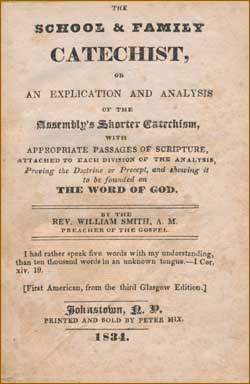 THE SCHOOL & FAMILY CATECHIST
THE SCHOOL & FAMILY CATECHIST
by Rev. William Smith (1834)
The Westminster Shorter Catechism, Questions 81 & 82.
Q. 81. What is forbidden in the tenth commandment?
A. The tenth commandment forbiddeth all discontentment with our own estate, envying or grieving at the good of our neighbor, and all inordinate motions or affections to any thing that is his.
EXPLICATION.
All discontentment with our own estate. –Every thing like being displeased, or dissatisfied, with that which God has ordered to be our lot in this world.
Envying. –Feeling uneasy or vexed at the welfare or happiness of another.
Inordinate motions and affections. –Excessive and unreasonable desires after what is not our own.
ANALYSIS.
The sins forbidden in the tenth commandment are of three kinds:
- All discontentment with our own estate. –1 Cor x. 10. Neither murmur ye, as some of them also murmured, and were destroyed of the destroyer.
- All envying or grieving at the good of our neighbor. –James iii. 16. Where envying and strife is, there is confusion, and every evil work.
- All inordinate motions and affections to any thing that belongs to our neighbor. –Col. iii. 5. Mortify, therefore, your members which are upon the earth; fornication, uncleanness, inordinate affection, evil concupiscence, and covetousness, which is idolatry.
Q. 82. Is any man able perfectly to keep the commandments of God?
A. No mere man, since the fall, is able, in this life, perfectly to keep the commandments of God, but doth daily break them in thought, word, and deed.
EXPLICATION.
No mere man. –No one who is only a human being, and nothing else. Hence the Lord Jesus Christ is excepted, who alone, since the fall, was able to keep the commandments perfectly; but he was both God and man in one person, and therefore was not a mere man.
Since the fall. –Since the time when Adam committed the first sin.
ANALYSIS.
In this answer we are taught two things:
- That no mere man since the fall, is able, in this life, to keep God’s commandments perfectly. –Eccles. vii. 20. There is not a just man upon earth who doeth good and sinneth not.
- That every man daily breaks God’s commandments. –Job xv. 14. What is man that he should be clean? Psal. xiv. 3. They are altogether become filthy; there is none that doeth good, no, not one.
We are here also taught, that mankind break the commandments of God in three ways:
- In thought. –Gen. viii. 21. The imagination of man’s heart is evil from his youth.
- In word. –James iii. 8. The tongue can no man tame, it is an unruly evil, full of deadly poison.
- In deed. –James iii. 2. In many things we offend all.
